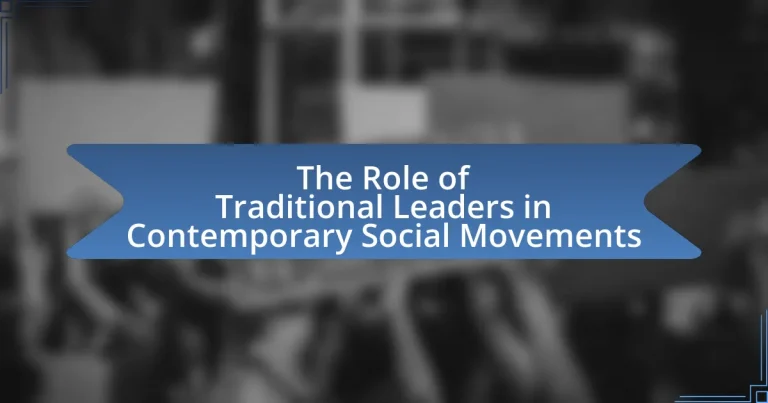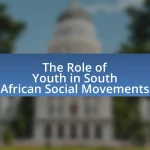Traditional leaders serve as vital figures in contemporary social movements, acting as cultural custodians and community mobilizers. They leverage their authority to advocate for social change, bridging traditional values with modern issues, particularly in African contexts. The article explores their influence on social movements, the historical context shaping their roles, and the challenges they face in navigating modern governance dynamics. It also examines how cultural values impact their authority, the importance of inclusivity, and strategies for effective engagement in social initiatives. Additionally, the article highlights the implications of generational divides and the role of education in empowering traditional leaders.
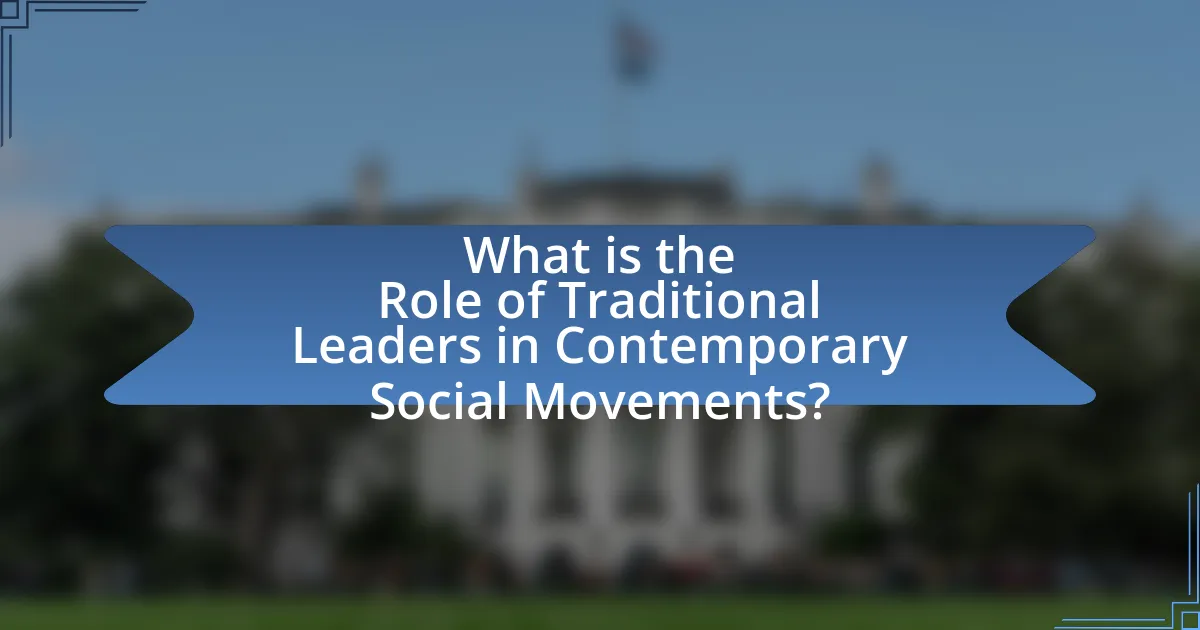
What is the Role of Traditional Leaders in Contemporary Social Movements?
Traditional leaders play a crucial role in contemporary social movements by acting as cultural custodians and community mobilizers. They leverage their authority and respect within communities to advocate for social change, often bridging the gap between traditional values and modern societal issues. For instance, in various African contexts, traditional leaders have been instrumental in promoting health initiatives, such as HIV/AIDS awareness campaigns, by utilizing their influence to encourage community participation and acceptance. Their involvement often enhances the legitimacy of social movements, as they can rally support and foster unity among diverse groups, thereby amplifying the movement’s impact.
How do traditional leaders influence social movements today?
Traditional leaders influence social movements today by serving as cultural symbols and community mobilizers, which enhances the legitimacy and reach of these movements. Their established authority and deep-rooted connections within communities allow them to galvanize support, articulate local grievances, and bridge gaps between grassroots activists and formal political structures. For instance, in South Africa, traditional leaders played a crucial role in the anti-apartheid movement by rallying communities and providing a unified voice against oppression, demonstrating their capacity to shape social change effectively.
What historical context shapes the role of traditional leaders in modern movements?
The historical context that shapes the role of traditional leaders in modern movements includes colonial legacies, cultural preservation, and socio-political dynamics. Colonialism often undermined traditional authority, leading to a complex relationship where traditional leaders now navigate between modern state structures and community expectations. For instance, in many African nations, traditional leaders are seen as custodians of cultural heritage, which positions them as vital actors in contemporary social movements advocating for rights and resources. Additionally, the rise of globalization has prompted traditional leaders to adapt their roles, often aligning with modern political movements to address issues such as land rights and social justice, thereby reinforcing their relevance in the current socio-political landscape.
How do cultural values impact the authority of traditional leaders?
Cultural values significantly impact the authority of traditional leaders by shaping the expectations and legitimacy associated with their roles. In many societies, traditional leaders derive their authority from cultural norms that dictate respect for elders, communal decision-making, and the preservation of heritage. For instance, in African cultures, the reverence for lineage and ancestral ties reinforces the power of chiefs and elders, as their roles are often seen as custodians of cultural identity and social cohesion. This is evidenced by the fact that in regions like West Africa, traditional leaders are often consulted in governance matters, reflecting their influence rooted in cultural values that prioritize collective well-being over individual interests.
Why are traditional leaders important in contemporary social movements?
Traditional leaders are important in contemporary social movements because they serve as trusted figures who can mobilize communities and lend legitimacy to causes. Their established authority and deep-rooted connections within their communities enable them to effectively advocate for social change, bridging the gap between grassroots movements and formal political structures. For instance, in many African nations, traditional leaders have played pivotal roles in movements addressing land rights and environmental issues, leveraging their influence to unite diverse groups and amplify their voices in national dialogues. This historical context underscores their significance, as seen in the role of traditional leaders during the anti-apartheid movement in South Africa, where they helped galvanize support and foster unity among various factions.
What unique perspectives do traditional leaders bring to social issues?
Traditional leaders bring a unique perspective to social issues by integrating cultural values and community norms into contemporary discussions. Their deep-rooted understanding of local traditions allows them to address social challenges in ways that resonate with community members, fostering trust and engagement. For instance, traditional leaders often serve as mediators in conflicts, utilizing established customs to promote dialogue and reconciliation, which can lead to more sustainable solutions. Additionally, their influence can mobilize community action, as seen in various African nations where traditional leaders have played pivotal roles in health campaigns, such as promoting vaccination and combating HIV/AIDS, thereby bridging the gap between modern interventions and traditional beliefs.
How do traditional leaders mobilize communities for social change?
Traditional leaders mobilize communities for social change by leveraging their cultural authority and social networks to inspire collective action. They often serve as trusted figures who can articulate community needs and aspirations, facilitating dialogue between community members and external stakeholders. For instance, in various African contexts, traditional leaders have successfully organized grassroots movements to address issues such as land rights and health initiatives, demonstrating their ability to galvanize support and drive social change. Their influence is rooted in historical legitimacy and the respect they command within their communities, which enables them to effectively advocate for social justice and development initiatives.
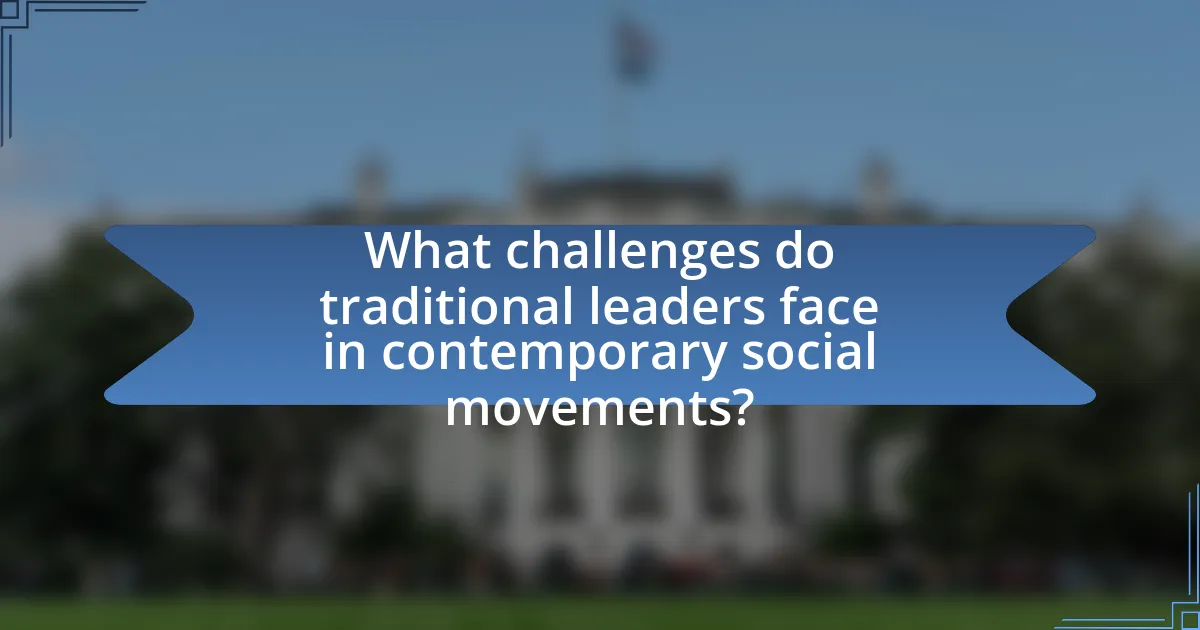
What challenges do traditional leaders face in contemporary social movements?
Traditional leaders face significant challenges in contemporary social movements, primarily due to the clash between traditional authority and modern democratic ideals. These leaders often struggle to maintain relevance as younger generations increasingly prioritize individualism and social justice over customary practices. Additionally, traditional leaders may encounter resistance from grassroots movements that advocate for change, viewing them as obstacles rather than allies. The erosion of their influence is further compounded by the rise of social media, which empowers marginalized voices and can undermine traditional hierarchies. For instance, in many African contexts, traditional leaders have seen their roles diminished as civil society organizations and youth-led movements gain traction, reflecting a shift towards more participatory governance models.
How do modern political dynamics affect traditional leadership?
Modern political dynamics significantly challenge traditional leadership by shifting power structures and altering community expectations. Traditional leaders, often rooted in historical authority and cultural practices, face pressure to adapt to contemporary governance models that prioritize democratic participation and accountability. For instance, the rise of social media has empowered citizens to voice their opinions and mobilize for change, diminishing the unilateral influence of traditional leaders. Additionally, political movements advocating for equality and representation often clash with the hierarchical nature of traditional leadership, leading to tensions within communities. This evolution is evident in various regions, such as Africa, where traditional leaders are increasingly required to collaborate with elected officials and civil society to remain relevant and effective in addressing modern societal issues.
What conflicts arise between traditional leaders and modern governance structures?
Conflicts between traditional leaders and modern governance structures primarily arise from differing sources of authority and legitimacy. Traditional leaders often derive their power from cultural heritage and community consensus, while modern governance structures typically rely on legal frameworks and democratic processes. This divergence can lead to power struggles, as traditional leaders may resist the imposition of state laws that conflict with customary practices, resulting in tensions over land rights, resource management, and social norms. For instance, in many African countries, traditional land tenure systems clash with national land policies, creating disputes that can escalate into broader social unrest.
How do traditional leaders navigate the influence of globalization?
Traditional leaders navigate the influence of globalization by adapting their roles to incorporate modern governance practices while maintaining cultural traditions. They engage in dialogue with global entities to ensure that local customs and values are respected in the face of external pressures. For instance, traditional leaders often participate in international forums to advocate for the rights and interests of their communities, thereby influencing policy decisions that affect their regions. This dual approach allows them to preserve their cultural identity while also benefiting from the economic and social opportunities that globalization presents.
What criticisms are directed at traditional leaders in social movements?
Traditional leaders in social movements face criticisms primarily for their perceived lack of inclusivity and adaptability. Critics argue that these leaders often prioritize traditional norms and hierarchical structures over the diverse needs and voices of the community, which can marginalize younger activists and those advocating for progressive change. For instance, in various movements, traditional leaders have been accused of resisting modern social justice issues, such as gender equality and LGBTQ+ rights, thereby hindering the movement’s overall effectiveness and relevance. This resistance can lead to a disconnect between the leadership and the grassroots activists, ultimately undermining the movement’s goals.
How do perceptions of legitimacy impact traditional leaders’ roles?
Perceptions of legitimacy significantly influence traditional leaders’ roles by determining their authority and effectiveness within their communities. When traditional leaders are viewed as legitimate, they can mobilize support, mediate conflicts, and influence social norms, thereby enhancing their capacity to lead social movements. Conversely, if their legitimacy is questioned, their ability to enact change diminishes, leading to reduced community engagement and potential challenges to their authority. For instance, in many African societies, traditional leaders who are perceived as legitimate often play crucial roles in local governance and community development, as evidenced by their involvement in initiatives like land management and conflict resolution. This dynamic illustrates that legitimacy is a critical factor in the effectiveness and acceptance of traditional leadership in contemporary social movements.
What are the implications of generational divides within communities?
Generational divides within communities can lead to significant social fragmentation and differing values, impacting cohesion and collaboration. For instance, younger generations may prioritize technology and social justice, while older generations might emphasize tradition and stability. This divergence can create misunderstandings and conflict, as seen in various social movements where traditional leaders struggle to bridge the gap between differing perspectives. Research indicates that communities with pronounced generational divides often experience reduced civic engagement, as younger members feel alienated from decision-making processes dominated by older leaders. This disconnect can hinder effective community mobilization and weaken collective action, ultimately affecting the success of social movements.
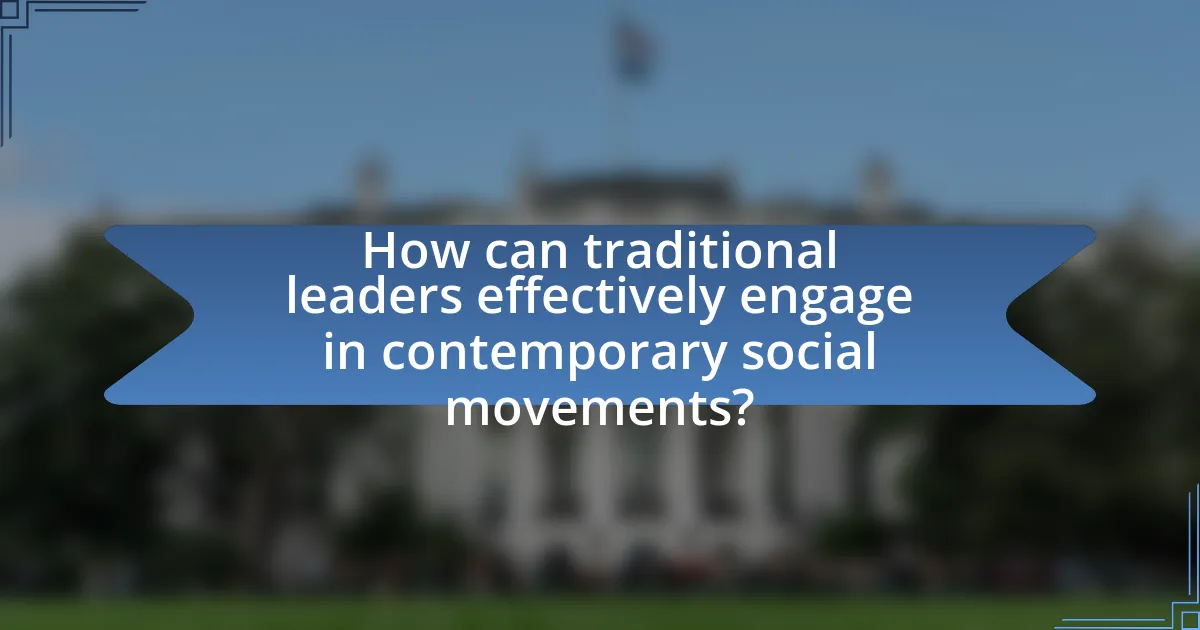
How can traditional leaders effectively engage in contemporary social movements?
Traditional leaders can effectively engage in contemporary social movements by leveraging their cultural authority and community trust to mobilize support and facilitate dialogue. Their established position within communities allows them to bridge gaps between traditional values and modern social issues, fostering collaboration among diverse groups. For instance, traditional leaders in South Africa have played pivotal roles in advocating for social justice and environmental sustainability, as seen in the work of the Council of Traditional Leaders, which actively participates in discussions on land reform and community rights. This engagement not only enhances the legitimacy of social movements but also ensures that local perspectives are integrated into broader societal changes.
What strategies can traditional leaders adopt to enhance their impact?
Traditional leaders can enhance their impact by actively engaging in community development initiatives and fostering collaboration with local governments and organizations. By participating in projects that address social issues such as education, health, and economic development, traditional leaders can leverage their influence to mobilize resources and support from various stakeholders. For instance, a study by the World Bank highlights that traditional leaders who engage in community-driven development projects can significantly improve local governance and service delivery, thereby increasing their relevance and authority within their communities.
How can traditional leaders leverage social media for advocacy?
Traditional leaders can leverage social media for advocacy by utilizing platforms to communicate directly with their communities, share important messages, and mobilize support for social causes. By creating engaging content that resonates with their audience, traditional leaders can raise awareness about issues affecting their communities, such as health, education, and cultural preservation. For instance, a study by the Pew Research Center indicates that 69% of adults in the U.S. use social media, highlighting its potential reach. Additionally, traditional leaders can use social media analytics to understand community needs and tailor their advocacy efforts accordingly, ensuring that their messages are both relevant and impactful.
What partnerships can traditional leaders form to strengthen their influence?
Traditional leaders can form partnerships with governmental bodies, non-governmental organizations (NGOs), and community-based organizations to strengthen their influence. Collaborating with governmental bodies allows traditional leaders to align their cultural authority with formal political structures, enhancing their legitimacy and access to resources. Partnerships with NGOs can facilitate development projects that resonate with community needs, thereby increasing the leaders’ relevance and support among their constituents. Additionally, engaging with community-based organizations fosters grassroots mobilization, empowering traditional leaders to advocate effectively for local issues. These partnerships are crucial as they leverage the strengths of each entity, creating a unified approach to addressing social challenges and enhancing the leaders’ influence within contemporary social movements.
What best practices should traditional leaders follow in social movements?
Traditional leaders should prioritize community engagement, transparency, and collaboration in social movements. Engaging with community members fosters trust and ensures that the leaders accurately represent the needs and aspirations of their constituents. Transparency in decision-making processes builds credibility and encourages participation, while collaboration with other stakeholders, including civil society organizations and government entities, enhances the effectiveness of social movements. For instance, traditional leaders in South Africa have successfully mobilized communities around issues like land reform by actively involving local populations in discussions and decision-making, demonstrating the impact of these best practices.
How can traditional leaders ensure inclusivity in their initiatives?
Traditional leaders can ensure inclusivity in their initiatives by actively engaging diverse community members in the decision-making process. This engagement can be achieved through regular consultations, public forums, and inclusive representation on advisory committees, which allows for a variety of perspectives to be heard and considered. Research indicates that initiatives that incorporate input from marginalized groups lead to more equitable outcomes, as seen in the participatory governance models implemented in various African nations, where traditional leaders have successfully integrated local voices into policy-making.
What role does education play in empowering traditional leaders?
Education plays a crucial role in empowering traditional leaders by enhancing their knowledge, skills, and ability to engage with contemporary issues. Through education, traditional leaders gain insights into governance, conflict resolution, and community development, which are essential for effective leadership in modern contexts. For instance, educated traditional leaders are better equipped to advocate for their communities, negotiate with government entities, and implement sustainable practices that align with both cultural values and modern societal needs. Studies have shown that communities led by educated traditional leaders experience improved social cohesion and development outcomes, demonstrating the positive impact of education on their leadership effectiveness.
